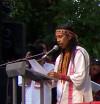Hugo Jamioy Juagibioy

Hugo Jamioy Juagibioy
Hugo Jamioy Juagibioy was born in Waman Tabanók (“Our sacred place of origin”), in the Valley of Sibundoy, Department of Putumayo. He belongs to the Kamuentsa Kabëng Kamëntsa Biyá (“Men of here with our own Thought and Language”) people, formed by some 7,000 kabëng (“Of ourselves”). Their principal activities are agriculture, handicrafts (fabrics, woodworks, musical instruments) and they are great practitioners of traditional Kamentsá medicine. Jamioy is studying Agronomic Engineering at the University of Caldas, Colombia.
Paleolithic and later primitive poetry, as Robert Graves showed in The White Goddess, was bound to the invocation of natural and supernatural forces, whose presence inspired a mixture of feelings that fluctuated between serene exaltation and horror. And there is certainly continuity between that poetry, which attracted divinity in the magical language of ecstasy, and the South American shaman who, with the aid of sacred plants, searches and guides the stray souls of the living and the dead; and ascends in a magical flight to the heavens to reestablish communication between men and their ancestors.
The shamanic experience of ecstasy reached by use of sacred plants reveals a vital fulfillment, a sense of limitless freedom, an unimaginable illumination of a being in possession of physical and spiritual energies never before perceived. It is an experience akin to that of the poet who, under the influence of these plants — in this case Jamioy and yage or ayahuasca — has access to another world:
where all truths repose,
the world where nothing
can be hidden
where nothing can be denied
the world where all
can be known
in that world I have arrived in my voyage
… all that I have seen
through the ayahuasca
that gives power
Jamioy’s poems are simple and deep - an expression of his longing for his ancestors and the paradisiacal lost land. Through them the shamans speak. Their roots are buried in the humus of spiritual traditions and the songs of his people. These bare, pure songs don’t lie, derived as they are from the traveling and bewitching influence of yage. In a way, they are not literature, they are the voices of the forest, the memory of an immense history.
In his poems, the poet and his people are in perpetual dialogue with the earth, mother of all life, with the sun and the moon, and with ancestors. Jamioy compares the story of his people with the story of his grandfather and when he wonders where his grandparents are, he writes:
where I am now,
there they are,
everything, everything for me,
is remembrance.
Often in his poetry, Jamioy refers to the taitas — the old men or shamans — who are, together with the sacred plants, the link with the past and with that other world “where all truths repose”. Accordingly, he once declared that when “an old indigenous man dies it is as if a whole library burns down.”
Bibliography
Mi fuego y mi humo, mi tierra y mi sol; Infección Editores, Facultad de Derecho Ciencias Jurídicas y Sociales, Dirección de Bienestar Universitario, Universidad Nacional de Colombia, Bogotá; 1999.
No somos gente; edition from the author. 2000.
Bínÿbe Oboyejuayëng/Danzantes del Viento; Juabna de América-Ediciones Indígenas; 2005.
Link
International Poetry Festival of Medellin web page: http://www.festivaldepoesiademedellin.org/pub/en/Revista/ultimas_ediciones/59_60/jamioy.html
Poems and short biography. In Spanish
Sponsors
























